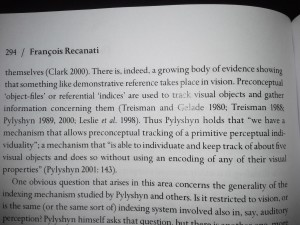That phrase is only vaguely intelligible to me even with context so I’m not gonna try to explain it. It comes from Recanati’s Deixis and Anaphora:
The point, though, is pretty clear, and interesting. Apparently some five objects in your perceptual field can be held in some sort of automatic index that can be drawn from when making sense of your surroundings. Recanati brings this up when talking about pronouns and how it’s possible for us to make sense out of a sentence like:
Yesterday, my brother talked to the policeman about the burglar we saw. He told him he thought he had escaped, but the policeman would not believe him, arguing that someone was awake, and he would have seen the burglar if he had left.
The pronouns used here are somehow not confusing even though they could each refer to various people in the context. Recanati suggests that there is a tracking mechanism for indexing pronouns analogous to Pylyshyn’s visual tracking mechanism. What interests me more is the last sentence about an auditory analog, though. I’m pretty sure I’ve come across ideas like this for music as reasons why 12 tone music sounds completely random to most people, for instance: a melody that arbitrarily hits all 12 pitches of an octave before repeating is simply too long to keep in memory and build a gestalt from. It might explain why noisy busy music, with many things happening at once, is sometimes unnerving as well.
Think I’m gonna file this as yet another thing I’d like to look into but will never ever have the time for.

Leave a Reply
You must be logged in to post a comment.